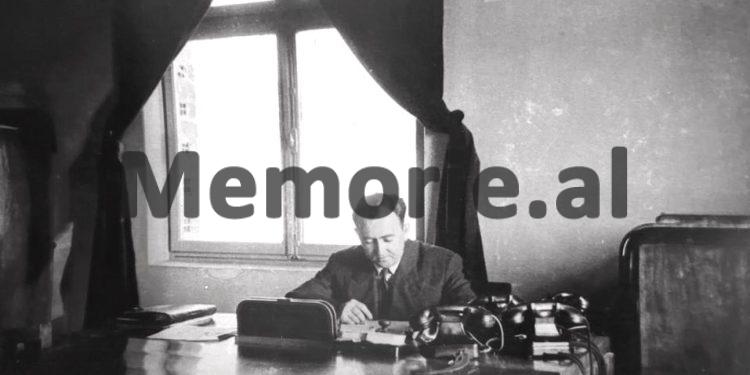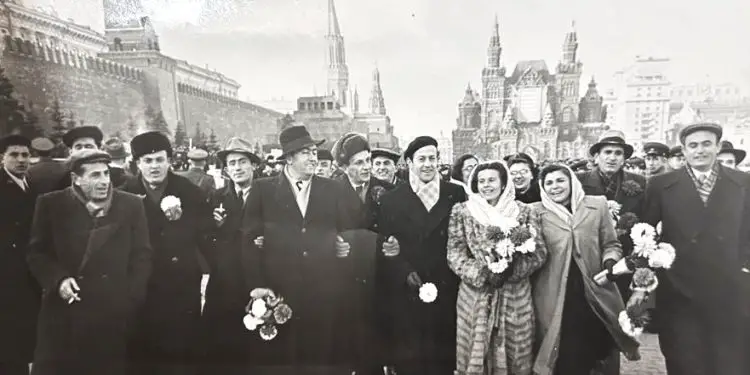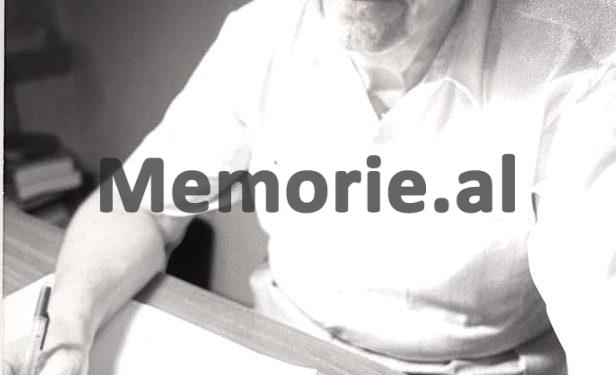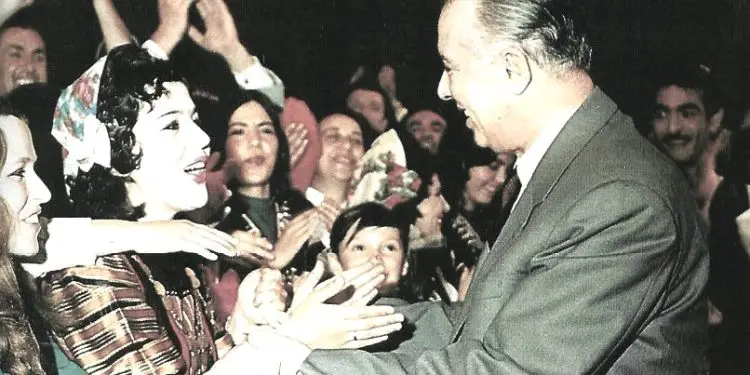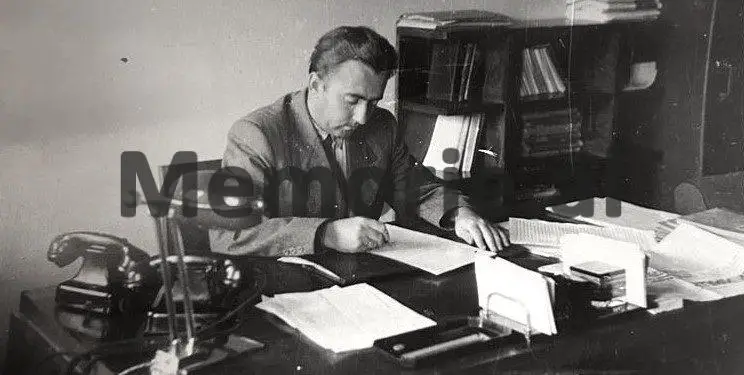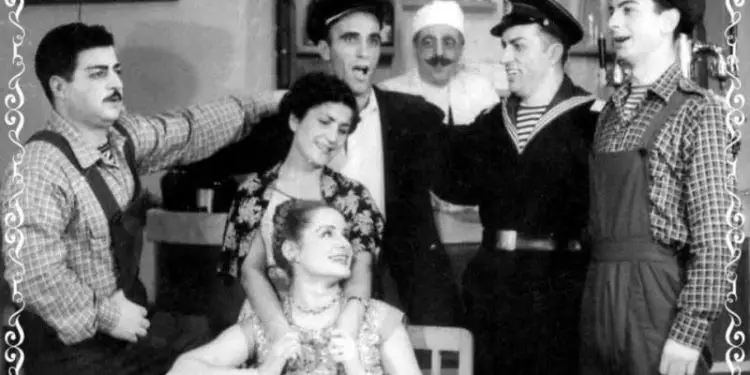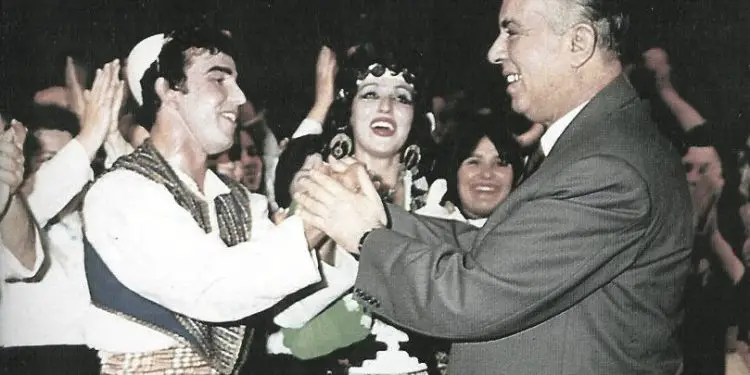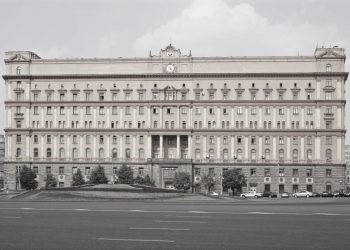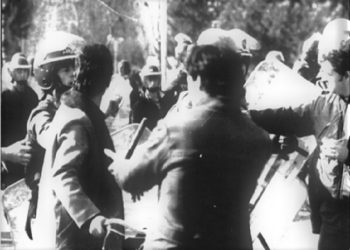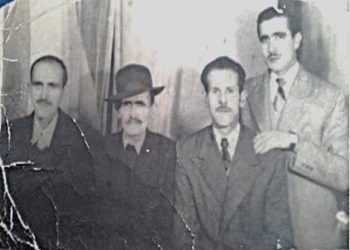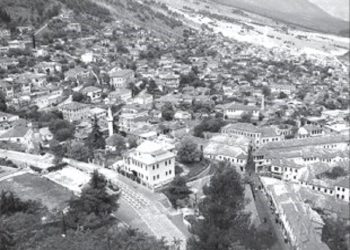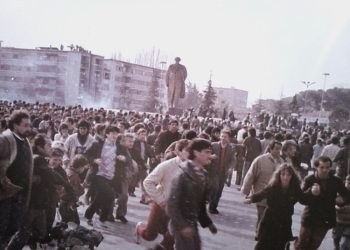By Fadil Paçrami
Part thirteen
Memorie.al / What is prison? It is the place where those who have been sentenced to deprivation of liberty are kept, we would say by reading any dictionary. But that is little. Prison and freedom – two opposites. Previously: what is freedom? In short: to be free means to do what you want, to think and act as you wish in the exercise and fulfillment of your freedoms and rights, as a person and as a citizen, but always without harming and violating others. . Again: to think and act. We are talking about democratic freedoms, from those of speech, press, assembly and organization in various parties and associations, ensuring the conditions where ideas, requests and human wills can find expression and concretization, from those of the biological-related plan with the being itself, to those of the social plan, related to the ways of living.
Continues from last issue
Also from the other
I carefully read the materials of the recent plenum of the League of Writers and Artists, which met on April 24-25 of this year. To say that I was as surprised as it was unclear, about how much was said about literary and artistic criticism, is a bit much.
So I was pushed to write and send them this letter. (Didn’t I send it to those who belong directly – the leaders of the League of Writers and Artists, because I don’t want any misunderstanding with consequences for them? But, if you called it useful, you make it known to them).
I know, it can be said to me: “No one will know what you think about the issues of literature and arts, that is, criticism.” It can also be said to me: “Stay wretched, in the trouble that has found you”! Here I can’t stay, I don’t know and I can’t remain a sorcerer, nor be silent, when something seems to me that it doesn’t work, gets in the way, something bad happens.
(I am repeating it: I am happy for every good thing that is done and it hurts me, for every bad thing. Secondly, I am a citizen of this country, so I have the right to express my opinions like anyone else). I think that the issue itself as a topic, in terms of importance and scope, and how it should be handled, is deeper and takes on a wider meaning.
However, the report that was held did not serve this purpose, since: on the one hand, it remained in the words and slurs and cracks that are repeated randomly; on the other hand, it emphasized the ethical views of the organization, i.e. not the essentials, about the causes, not orienting the discussions to the right.
Thus, after accepting the “content in the field of criticism” and that today’s developments “require a literary and artistic criticism… more reasoned and freed from old clichés and stereotypes”, the report from the beginning narrows everything… I he looks for and finds weaknesses “in the absence of debate”, to which he returns several times; in “intolerance”, with which he deals for a long time; in “criticism-editorship” relations, which are blamed the most: in “insufficient emancipation”, which is called for; as well as in the need for “some administrative solutions” listing quite a few, “should”, “missing”, “required” and others of this type, so to speak organizational. The “schematism” that boils in the mouth, is easily and clearly passed.
Surprise! or no wonder:
– This is how sharp problems escape!
– Or is this the current theoretical and scientific level?
– Or was this to cover up and hide the truth? In the report that was held and in the discussions that took place (from what was published in “Drita”), the great truth was not told: that literary criticism has not helped, but with its schematic requirements and shallowness, it has inhibited quite a bit and has grossly misdirected creativity (taking it as a whole, not for the authors of works that have not noticed)…!
These should be revealed loudly and wisely, the plenum for criticism. But this was not done in the report, the chairmanship was not engaged and avoided, the discussions were not even focused. The question here is this: what’s stopping you? It’s not for me to answer, not that I don’t have thoughts on what and how. I said something, I will say it below, and here I am summarizing it in one word: taboos, schemes.
– Under these conditions, with that report, all that was said, there was not and could not be – neither discussions on a level, or a debate where opinions were exchanged, not about trifles, but about fundamental issues.
In fact, this was evident in the discussion organized in the literary press and should have preceded the plenum.
The critics themselves got, so to speak, into the trenches, they didn’t feel like the wave would pass, while the creators called it too much to talk about what they knew was not worth it, some even thought: why “break with the gods” , since those critics, publishers and researchers who else set them in motion come back and take revenge.
Well, people have opinions. It can be said that calls have been made and are being made to them to speak, to express their thoughts without fear, then why is he reluctant? The question remains. Something is in the way! They are what was talked about above, including the uncertainty, there is no need to repeat them.
I would like to add one more obstacle: those incompetent people, generally failures for themselves, who have occupied positions in editorial offices and institutions, do not know how to do anything else, except to show themselves as diligent watchmen, putting themselves in the role of the censor, they shoot with lenses and tweezers in their hands, every word, thought, form and means of expression, which come out of the schemes of frozen clichés, as well as rise above the tastes of mediocrity, where they cannot reach.
Burrell, 8.6.1989
EXTRA FOR THE THEATER
What is it to me – a tendency, a means of expression, a passion? All together. I connected with him early on. It came growing up and accompanied me through the good and the bad, it will accompany me until the end of my life. When it started and how it got to that size is a story in itself. In two words: when I was young, I followed with interest the shows that were given at that time in Shkodër by the amateur troupes of the “Bogdani”‘, “Besa” societies, etc. This continued even later, when I was abroad for studies, and after that. In 1957, I wrote my first play.
In the 60s, some of my pieces were staged. I wasn’t separated from him, or rather, I wasn’t separated from him even in prison, where I was given the medicine to face everything that happened to me and remain who I was. So I owe him a lot. In a letter from prison, which was done to silence me, I expressed: – When I write, I am no longer a prisoner with his worries, but I keep all the features of a “living man”. This is one of the reasons why I write: I want to remain like that. It helps me that am why.
I won’t hide it from you: it has become like an illness to me, a second being. There was no passion more stupid than this – the theater: “Most stupid”, in the most unrestrained sense, which does not leave you alone, does not leave you alone. It makes you meditate, search, create, enriches your thoughts and feelings, and gives you pleasure. In these, taken separately, each one and all together lay the value of his role, both for the author, actors and others in the theater, as well as for viewers, readers, etc.
Much has been said and written about the theater as one of the most exciting, attractive and communicative genres of art, the arena of the match of old moral norms with new ones, the real with the unreal, the truth and the great with the immoral and hypocrisy, as a carrier and powerful spreader of ideas and feelings, school of crying and laughter, where, as Schiller says:
“…Everything appears in the square, directly and vividly, where vice and virtue, pleasure and suffering, idiocy and wisdom, pass before man with thousands of tangible and true pictures, where prophecy solves before him the riddles and schoklav the knots of fates, where the human heart confesses under the torture of passions and simple motions, where all masks fall, where blushes disappear, and where incorruptible truth, like Radomantius (the judge of Zeus) holds court.
And continues:
…The theater punishes thousands of vices left unreported, for which justice is silent; it makes thousands of virtues famous…! In the merciless mirror of the theater, the more attractive the virtue, the more despised the vices are presented…! Only the theater has been given the right to make fun of our weaknesses, because it embodies our feelings and does not ask who is this and that guilty…!
The scene tells us the secret, how to track them down and render them harmless. She took off the hypocrite’s artificial mask and showed us the net, in which cunning and intrigue wrapped us. She took out the deceit and the lie from the devious labyrinth and showed the world, their terrible face”!
As well as: “The theater unfolds before us various scenes of human suffering. It acquaints us with the misfortunes of others; it rewards us with tears of joy and the gain of experience and courage… Theater is an institution. Where pleasure is interwoven with preaching, tranquility with excitement, amusements with culture, where no power of the soul is strained to the detriment of another…! Here, along with foreign sorrow, the unfortunate mourns his own sorrow, the happy begins to “sees things with a more realistic eye, the careless falls into thoughts, the sensitive delicacy overcomes courage and the arrogant and the monster, begins to feel for the first time, for what he does…”!
What else can be said? Here is what this passion brings and its benefits. That’s what it is – theater. For these I love him and became more and more attached to him, I didn’t give up even after what happened to me. Others didn’t like this, but…! Of course, at the time of the dictatorship, there was no place – and you can’t even expect from her, for such views and evaluations.
For the party-state, theater as well as all literary and artistic creativity and cultural institutions should be put at its service. And as is known, there have been confrontations, matches, collisions and wars between real creativity for its realistic and qualitative developments, with the interventions, restrictions and dictates that were exercised to keep them within the framework of official politics.
The result: we also had a real and level creativity which cannot be denied, so the voices that want to erase everything are out of place, malicious and unreal; we had another hymnist, servile and without artistic value. For the latter, they have influenced by entering into a disgusting and consequential game, from the kissing leaders of the organisms that dealt with the culture and mediocre creators, to the highest leaders of the country, in whom nothing but ignorance is visible of primitive tastes and nervousness, of the fight for preferences and preferences!
There are many sensational cases that speak of these. Below, I’m stopping a little, to complete this frame, of one of them for which a noisy intervention was made public, typical of what was talked about. It is the case of everything that happened at the national meeting of theaters in ’69, regarding the part “Brown Stains”. To the surprise of those present, what caught the eye that evening when she appeared, Mehmet Shehu appeared in the government lodge.
I said about the “surprise”, how he was not known as a lover of theater and literary and artistic creativity as a whole, even that he had a certain mistrust and phobia towards writers and artists, intellectuals in general, which is what was talked about. Ramiz Alia had also come, apparently attracted by him. What prompted him? I somehow knew how, when the author presented this drama, to be staged in the theater of Korça, under pressure, he had boasted that he had received the idea and was based on some thoughts expressed recently, by Mehmet Shehu, in his speeches and writings, I said to myself that it has not come in vain.
It was the years when he had undertaken a noisy campaign against outside influences, fashions and the danger of youth degeneration. Noticing his applause and laughter, during the performance, the suite of serviles accompanied him and meanwhile whispered, that; “friend Mehmet liked it”. When during the break, I went to it as a separate room, where he and the others were talking about the show, after a while Ramizi addressed me: “I noticed you didn’t clap as much, or so it seemed to me” .
The troupe plays well, I answered, maybe this confuses the viewers a bit, but I’m waiting for the end, then I can say something more concrete. I didn’t extend it any further, Mehmet didn’t interfere, it didn’t feel good to him, but he got over it. The jury, appointed by the Ministry of Education and Culture, received the messages that came from the lodge and decided: The first prize is awarded to the Korça Theater, with the drama “Njollat e murrme”, for its ideological and artistic values. It could not be otherwise.
This pleased Mehmet Shehu a lot and R. Alisa also approved. “The next day, although it was not foreseen in the program, a big remark was given to the participants and as it was said, the idea for this was given by the prime minister. Again to the surprise, but not to everyone, in that reception that was given in one from the biggest halls of the capital – the Central House of the Army, Mehmet Shehu came again. There were also Ramiz Alia, Haki Toska and others. He even greeted them with a speech full of praise and guidance, on how literature should be developed in us and arts, which was accompanied by tam-tame from the suite.
For me, the piece was permeated by the idea of mistrust, denigration and fear, towards young people – his favorite theme and repeated so often, and with concern from him, especially recently, where it was pointed out it was emphasized: “If the second generation, the one after the war (the doctor who was the son of a warrior and a worker), became bad and degenerated; the third (the doctor’s son), ended up as a hooligan; the fourth, fifth and so on, who knows what monsters they will be (according to this logic): murderers and criminals, so you have to stand on their heads, falling hard, before it’s too late”.
That the generations, from the second, the third even more, were falling into conflict with the one in power for many things and his despotism, this was clear, but not in the sense that Mehmet Shehu screamed and echoed the part in question. This opinion about the drama, since he was speaking with superlatives, I showed Haki Toska, who was by my side at that moment.
He spoke something about this to Ramiz Ali, next to him and Ramiz then passed it on to Mehmet. He waited to thunder, as he was used to in such cases, if anyone opposed him, but no, he did not call it opportune and limited himself, with a throwaway: “Fadili is unhappy, therefore also subjective, because he did not win the part of his”. This is one of the views.
After two nights, Enver Hoxha went to see the piece, and here another scene begins. As is known, he rejected it completely and nervously, ordered it not to be played again, on any of the theater stages, calling it wrong, etc., etc., in open opposition to Mehmet Shehu. What was this? How did it happen and why? The comments were different. But how should it really be understood? How did it happen and why?!
The comments were different. Both of them were neither lovers of the theater, nor did they know about drama, as in other matters of literature and arts, even though they presented themselves as deep connoisseurs of them. But here the two were badly mixed up – the starting points and goals were other, non-literary. I don’t know and I can’t say anything, if they had heard of what some of the rest of us had expressed about those who were spoken about above.
I don’t even say that he revealed anything, as far as that part was concerned, since this is not clear, even in the speech he gave those days in the Political Bureau, which was published later. The trick was elsewhere; these spheres – that of creativity, science and with intellectuals, Enver called them his own and did not allow interference, even less from Mehmet. And it was not the first time, that when one person said well about something, the other would say bad, or vice versa. This too: Enver, who was more restrained and covered, did not have to spoil it with the young people, while Mehmet, unrestrained and arrogant.
Anyway, this case is typical (that’s why I dealt with it) that speaks of the interventions of the high spheres of the party – the state in the works of creativity and how far it reached, while the forms, dimensions and paths it took, speak that literature and arts , had begun to stir up and irritate the leading staff of that time, to cause trouble for them, as well as for the leading role of the theater, the weight and influence it exerts, as was elaborated above.
Since that time, it happened that the theater was put under a greater tutelage and control, targeted and under attack. In this framework of perspective, I have seen everything that happened later, why I became the object and subject of the blows from that time, more openly in the early 70s, which led to the 4th Plenum of the Central Committee of PPSh. Memorie.al
The next issue follows




